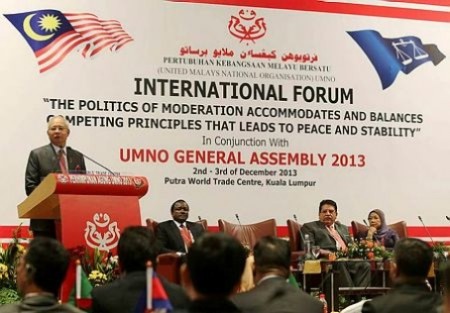The debate as to whether Malaysia is a secular or religious state is still rampant in political dialogue, with the balance between secular and Islamic values being extremely complex. What is clear is that Malaysian politics do not occur in an “Islamic vacuum, absent any other considerations or influences” (Miller 2004). Non-governmental actors have helped to create a political climate in which government narrative is not readily accepted but is subject to scrutiny, making the authorities accountable for actions that are incompatible with democratic principles. The main points of contention for these external actors include the government’s perceived encroachment on civil liberties including freedom of speech, and their enforcement of divisions along religious and ethnic lines. New communication technologies have been established as vital and demonstrably effective tools for these actors in their efforts to promote democratic values in modern Malaysia.
Perhaps unsurprisingly, the most influential non-governmental actor in Malaysian politics has proven to be the government’s main opposition, Pakatan Rakyat (PR). Consisting of three parties – People’s Justice Party (PKR), Democratic Action Party (DAP) and Pan-Malaysian Islamic Party (PAS) – the coalition had unprecedented success in the May 2013 general election, despite not winning enough seats to form government. PR’s remarkable victory was intricately linked to their adept use of social media as an instrument for championing their stated values of democracy, equality and separation of powers (Siang 2009). While Islam remains a defining characteristic of PR, even PAS (which began as a conservative Islamist movement) has recognised the importance of incorporating secular values in governance, and now campaigns for the implementation of fair and democratic systems within an Islamic context. Managing to put aside their ideological differences, the PR coalition has formed a united voice advocating improved governance, control of corruption, strengthening of the rule of law, and equitable development (Welsh 2013).
While Malaysian media, both mainstream and alternative, have focused on the skilful use of new technologies by the opposition, this can serve to valorise the medium over the message (Smeltzer & Lepawsky 2010). Certainly, PR’s effective application of social media provided a powerful platform through which to channel their political agenda; but public response demonstrates that theirs was a message to which Malaysian citizens were more than receptive. Indeed, Castells argues that the information age “has never been a technological matter. It has always been a matter of social transformation, a process of social change in which technology is an element that is inseparable from social, economic, cultural and political trends” (Castells with Catterall 2001). So, although new technologies have played a pivotal role in the opposition’s ability to disseminate its narrative of democracy and equality, it is important not to lose sight of the fact that it is the message itself that has galvanised the public and which therefore holds the true value.
National pressure groups have also been instrumental in advancing democratic aims, with organisations focusing on issues from human rights to free elections. Leading the movement to expose electoral corruption is Bersih (the Malay word for clean), which since 2006 has worked to reveal Barisan Nasional’s (BN) control over the supposedly nonpartisan Electoral Commission, pointing to dubious voter records and other significant anomalies (Case 2013). Bersih made innovative use of social media during the 2013 election by creating a virtual protest app where users could demonstrate against the government in an interactive online forum. Their efforts to educate the public about issues relating to electoral corruption have heightened mass support for a transparent and fair election system in Malaysia.
Malaysian politics have spread beyond the country’s borders; the international community, as well as an extensive Malaysian diaspora, are significantly invested in the progression of Malaysia’s democratic practices. Narratives on increasingly accepted international norms of human rights and secularism are circulating in Malaysian society, aided again by the rapid spread of information and ideas facilitated by new technologies. The intervention of international governing institutions, often responding to pressure from Malaysian advocacy groups, has also raised expectations of democratic standards in the country. The UN has recently urged the Malaysian government to resolve issues including repealing the ban on the use of the word ‘Allah’ for non-Muslims, and ensuring the environmental rights of indigenous populations in the face of Malaysia’s growing palm oil industry.
An increasingly formidable opponent, a fervent and politically engaged public, and the participation of the wider international community are all contributors to an environment in which the government has been compelled to accede to certain democratic standards. BN is now beginning to make use of the powerful new mediums available to them and is growing its social media presence, in an effort to engage with the country’s young majority population and hold on to the authority it has enjoyed for decades. Nevertheless, the closeness of the 2013 election indicates the underlying shift in political attitudes in Malaysia, and signals a possible changing tide for democracy in the nation.
Danielle May is a research scholar at the University of South Australia.
References
Case, W 2013, ‘Malaysia in 2012: A non election year’, Asian Survey, vol. 53, no. 1, pp. 134-141.
Castells with Catterall 2001, referenced in Bell, D 2007, Cyberculture Theorists: Manuel Castells and Donna Haraway Routledge, New York.
Miller, E 2004, ‘The Role of Islam in Malaysian Political Practice’, The Fletcher School Online Journal for issues related to Southwest Asia and Islamic Civilization, vol. 4, pp. 1-10.
Siang, L. K. (2009). ‘The Policies of Pakatan Rakyat’, Lim Kit Siang for Malaysia.
Smeltzer, S & Lepawsky, J 2010, ‘Foregrounding technology over politics? Media framings of federal elections in Malaysia’, Royal Geographical Society, vol. 42, no. 1, pp. 86–95.
Welsh, B 2013, ‘Malaysia’s Elections: A Step Backward’, Journal of Democracy, vol. 24, no. 4, pp. 136-150.
 Facebook
Facebook  Twitter
Twitter  Soundcloud
Soundcloud  Youtube
Youtube  Rss
Rss 